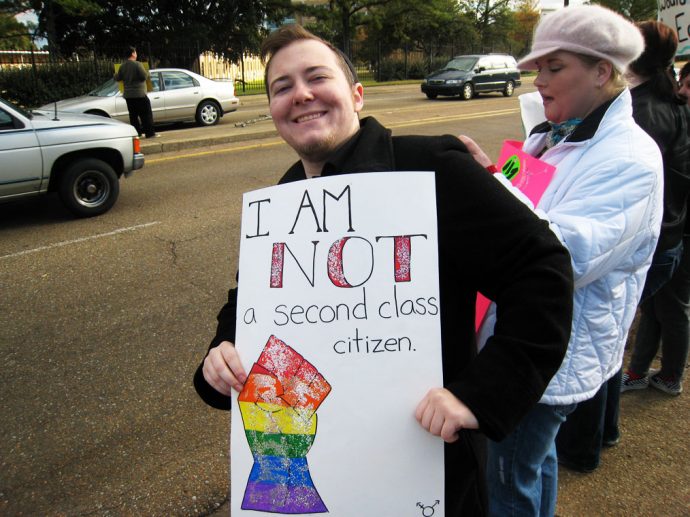Mississippi’s House Bill 1523, the law the Freedom From Religion Foundation’s Andrew Seidel called “excruciatingly different” from most generic religious freedom laws because it protects only three specific religiously-based beliefs, was struck down last week just hours before it was set to go into effect. In issuing the late-night injunction, Judge Carlton Reeves ruled the law not only violated the Fourteenth Amendment’s equal protection provisions but also the Establishment Clause of the First Amendment.
But Reeves didn’t just stop there. In a 60-page opinion, the federal judge placed Mississippi’s law within its social and political context: the massive backlash (largely by the religious right) against LGBT rights after last summer’s Obergefell decision legalized same-sex marriage throughout the United States. His ruling was thus a critique not just of HB 1523 but of the misguided logic and legal reasoning underpinning many of the other laws that sanction discrimination against LGBT individuals in the purported name of religious freedom.
Below are the best lines from Reeve’s ruling, along with the bigger truths they reveal about the religious freedom debates. (You can also check out the full opinion here.)
Bills like HB 1523 didn’t come out of nowhere:
In physics, every action has its equal and opposite reaction. In politics, every action has its predictable overreaction. Politicians reacted to the Hawaiian proceedings with DOMA and mini-DOMAs. Lawrence and Goodridge birthed the state constitutional amendments. And now Obergefell has led to HB 1523. The next chapter of this back-and-forth has begun.
Less charitably, but also true, is the reality that every time lesbian and gay citizens moved one step closer to legal equality, voters and their representatives passed new laws to preserve the status quo.
LGBT rights activists want just that — equal rights:
Nothing in the plaintiffs’ briefs, oral argument, or testimony indicates that they expect a favorable ruling to change the hearts and minds of Mississippians opposed to same-sex marriage, transgender equality, or sex before marriage. They simply ask the Court to enjoin the enforcement of a state law that both permits arbitrary discrimination based on those characteristics and endorses the majority’s favored religious beliefs.
Bills like HB 1523 that purport to protect religious freedom often do so at the direct expense of marginalized groups:
The title, text, and history of HB 1523 indicate that the bill was the State’s attempt to put LGBT citizens back in their place after Obergefell. The majority of Mississippians were granted special rights to not serve LGBT citizens, and were immunized from the consequences of their actions. LGBT Mississippians, in turn, were “put in a solitary class with respect to transactions and relations in both the private and governmental spheres” to symbolize their second-class status.
Just because a law doesn’t spell out L-G-B-T doesn’t mean it isn’t discriminatory:
It is also inconceivable that a discriminatory law can stand merely because creative legislative drafting limited the number of times it mentioned the targeted group. The Court cannot imagine upholding a statute that favored men simply because the statute did not mention women.
Religious freedom isn’t a carte blanche for one group to write laws that value their beliefs over others:
Given the pervasiveness of Christianity here, some Mississippians might consider it fitting to have explicitly Christian laws and policies. They also might think that the Establishment Clause is a technicality that lets atheists and members of minority religions thwart their majority (Christian) rule.
The public may be surprised to know the true origins of the Establishment Clause. As chronicled by the Supreme Court, history reveals that the Clause was not originally intended to protect atheists and members of minority faiths. It was written to protect Christians from other Christians.
The essential insight from history is that the First Amendment was originally enacted to prohibit a state from creating second-class Christians. And while the law has expanded to protect persons of other faiths, or no faith at all, the core principle of government neutrality between religious sects has remained constant through the centuries.
It is not within our tradition to respect one clerk’s religious objection to issuing a same-sex marriage license, but refuse another clerk’s religious objection to issuing a marriage license to a formerly divorced person. The government is not in a position to referee the validity of Leviticus 18:22 (“Thou shalt not lie with mankind, as with womankind: it is abomination.”) versus Leviticus 21:14 (“A widow, or a divorced woman, or profane, or an harlot, these shall he not take.”)
Finally, religious freedom has its limits — when it harms others:
The critical lesson is that religious accommodations must be considered in the context of their impact on others.


